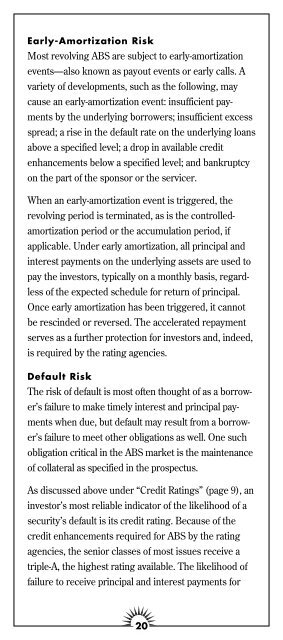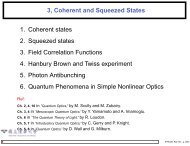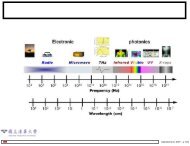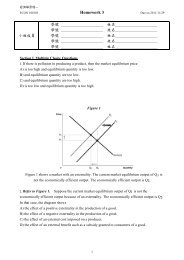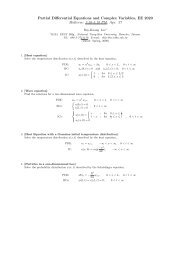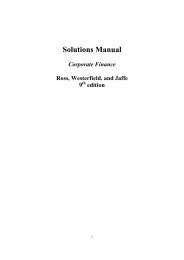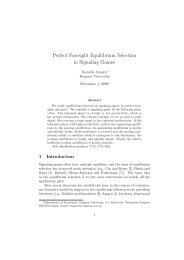assetbacked Pages
assetbacked Pages
assetbacked Pages
You also want an ePaper? Increase the reach of your titles
YUMPU automatically turns print PDFs into web optimized ePapers that Google loves.
Early-Amortization Risk<br />
Most revolving ABS are subject to early-amortization<br />
events—also known as payout events or early calls. A<br />
variety of developments, such as the following, may<br />
cause an early-amortization event: insufficient payments<br />
by the underlying borrowers; insufficient excess<br />
spread; a rise in the default rate on the underlying loans<br />
above a specified level; a drop in available credit<br />
enhancements below a specified level; and bankruptcy<br />
on the part of the sponsor or the servicer.<br />
When an early-amortization event is triggered, the<br />
revolving period is terminated, as is the controlledamortization<br />
period or the accumulation period, if<br />
applicable. Under early amortization, all principal and<br />
interest payments on the underlying assets are used to<br />
pay the investors, typically on a monthly basis, regardless<br />
of the expected schedule for return of principal.<br />
Once early amortization has been triggered, it cannot<br />
be rescinded or reversed. The accelerated repayment<br />
serves as a further protection for investors and, indeed,<br />
is required by the rating agencies.<br />
Default Risk<br />
The risk of default is most often thought of as a borrower’s<br />
failure to make timely interest and principal payments<br />
when due, but default may result from a borrower’s<br />
failure to meet other obligations as well. One such<br />
obligation critical in the ABS market is the maintenance<br />
of collateral as specified in the prospectus.<br />
As discussed above under “Credit Ratings” (page 9), an<br />
investor’s most reliable indicator of the likelihood of a<br />
security’s default is its credit rating. Because of the<br />
credit enhancements required for ABS by the rating<br />
agencies, the senior classes of most issues receive a<br />
triple-A, the highest rating available. The likelihood of<br />
failure to receive principal and interest payments for<br />
20<br />
such securities is remote. The ABS sector has, in fact,<br />
performed remarkably well from a credit perspective.<br />
The B, C and any lower classes of an ABS issue are<br />
lower-rated or unrated and, indeed, are designed to<br />
absorb any losses before the senior tranche. Prospective<br />
buyers of these pieces of an issue must decide if<br />
the increased risk of default is balanced by the higher<br />
returns these classes pay.<br />
TAX STATUS OF ABS<br />
Generally, only the interest portion of payments to ABS<br />
investors is subject to income tax—state and local<br />
(if applicable), as well as federal. The portion of the payments<br />
that represents return of principal or original<br />
cost is not taxable.<br />
However, if the securities were purchased at an original-issue<br />
discount or a market discount, different rules<br />
apply. In the first case, if an investor buys an <strong>assetbacked</strong><br />
security when it is issued for a price that represents<br />
a discount from its face value, the investor may be<br />
taxed on the discount that accrues on the security<br />
before the investor actually receives it. In the second<br />
case, if the security was purchased at a discount in the<br />
secondary market, the investor may be subject to a tax<br />
on the accrued market discount as principal payments<br />
are received on the security, as well as on the interest<br />
payments.<br />
Foreign Withholding<br />
Generally, an individual who is not subject to U.S. taxation<br />
who purchases an ABS issued by a U.S. issuer<br />
would not be subject to U.S. withholding tax to the<br />
extent that the security qualifies for the portfolio interest<br />
exemption and also qualifies as a debt security for<br />
U.S. tax purposes. (Some ABS are, for certain technical<br />
21


